浅谈十八世纪英国书信体小说特征-李骠
- 格式:doc
- 大小:29.50 KB
- 文档页数:4
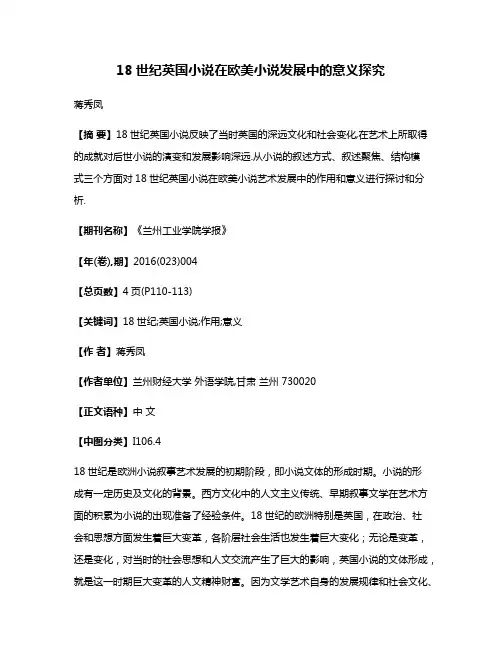
18世纪英国小说在欧美小说发展中的意义探究蒋秀凤【摘要】18世纪英国小说反映了当时英国的深远文化和社会变化,在艺术上所取得的成就对后世小说的演变和发展影响深远.从小说的叙述方式、叙述聚焦、结构模式三个方面对18世纪英国小说在欧美小说艺术发展中的作用和意义进行探讨和分析.【期刊名称】《兰州工业学院学报》【年(卷),期】2016(023)004【总页数】4页(P110-113)【关键词】18世纪;英国小说;作用;意义【作者】蒋秀凤【作者单位】兰州财经大学外语学院,甘肃兰州 730020【正文语种】中文【中图分类】I106.418世纪是欧洲小说叙事艺术发展的初期阶段,即小说文体的形成时期。
小说的形成有一定历史及文化的背景。
西方文化中的人文主义传统、早期叙事文学在艺术方面的积累为小说的出现准备了经验条件。
18世纪的欧洲特别是英国,在政治、社会和思想方面发生着巨大变革,各阶层社会生活也发生着巨大变化;无论是变革,还是变化,对当时的社会思想和人文交流产生了巨大的影响,英国小说的文体形成,就是这一时期巨大变革的人文精神财富。
因为文学艺术自身的发展规律和社会文化、思想进步是相互砥砺的,18世纪英国小说作为一种新的文学体例,其文体的确立也是英国经济社会进一步发展和相对成熟的社会表现。
作为一种新的叙事文体,18世纪英国小说在艺术上所取得的成就对后世小说的演变和发展影响深远。
18世纪英国小说的叙述者、叙述聚焦者类型尚处于较为简单的阶段,但其聚焦对象却发生了巨大的变化,既使文学走上了大众化的道路,也为20世纪小说艺术的发展开辟出新的方向。
这一时期的叙述者,只有第一人称,表现为人物叙述者与全知全能的外在式叙述者两种类型。
不过这两种类型已经涵括了后世小说使用最广泛的第一人称和第三人称两种叙述方式。
第一人称人物叙述的方式在19世纪英国和欧洲小说创作中并未得到充分的发展,但是由于其表达情感的便利,在20世纪得到广泛的推崇,充分显示了其深刻表达人物内心世界的优越性。


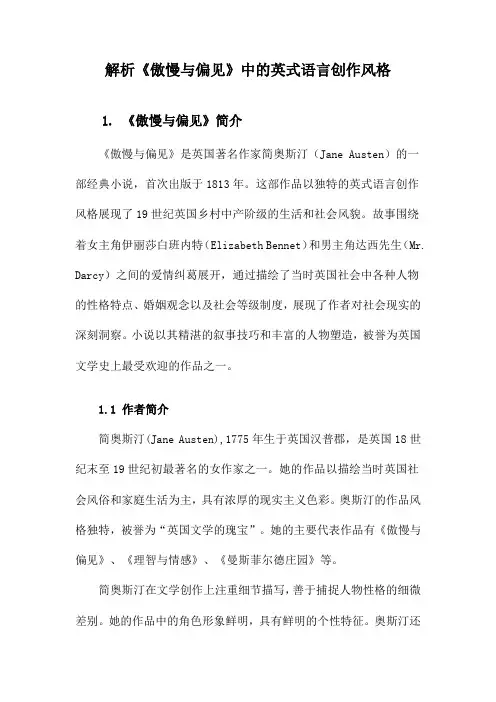
解析《傲慢与偏见》中的英式语言创作风格1. 《傲慢与偏见》简介《傲慢与偏见》是英国著名作家简奥斯汀(Jane Austen)的一部经典小说,首次出版于1813年。
这部作品以独特的英式语言创作风格展现了19世纪英国乡村中产阶级的生活和社会风貌。
故事围绕着女主角伊丽莎白班内特(Elizabeth Bennet)和男主角达西先生(Mr. Darcy)之间的爱情纠葛展开,通过描绘了当时英国社会中各种人物的性格特点、婚姻观念以及社会等级制度,展现了作者对社会现实的深刻洞察。
小说以其精湛的叙事技巧和丰富的人物塑造,被誉为英国文学史上最受欢迎的作品之一。
1.1 作者简介简奥斯汀(Jane Austen),1775年生于英国汉普郡,是英国18世纪末至19世纪初最著名的女作家之一。
她的作品以描绘当时英国社会风俗和家庭生活为主,具有浓厚的现实主义色彩。
奥斯汀的作品风格独特,被誉为“英国文学的瑰宝”。
她的主要代表作品有《傲慢与偏见》、《理智与情感》、《曼斯菲尔德庄园》等。
简奥斯汀在文学创作上注重细节描写,善于捕捉人物性格的细微差别。
她的作品中的角色形象鲜明,具有鲜明的个性特征。
奥斯汀还擅长运用讽刺手法,对当时社会的种种弊端进行批判。
她的作品不仅具有很高的文学价值,还为后世的作家提供了丰富的创作灵感。
1.2 作品背景英国作家简奥斯汀(Jane Austen)创作的长篇小说《傲慢与偏见》是其文学史上的瑰宝。
小说以当时的英国社会背景作为创作的舞台,真实地展现了那个时代的情感和社会面貌。
十八世纪末期的英国,正处于工业革命的前夕,整个社会正处于新旧交替的过渡阶段。
在乡村社会和经济关系不断变化的背景下,小说通过描写年轻男女间的情感纠葛和婚姻问题,折射出了英国社会普遍的价值观和风俗习惯。
小说的语言创作风格,深受当时的社会语境和文学风格的影响,呈现出独特的英式语言特色。
奥斯汀的作品被认为是英国古典文学的杰作之一,不仅继承发展了欧洲传统的文学作品风格,还融入了当时英国社会的时代特征。

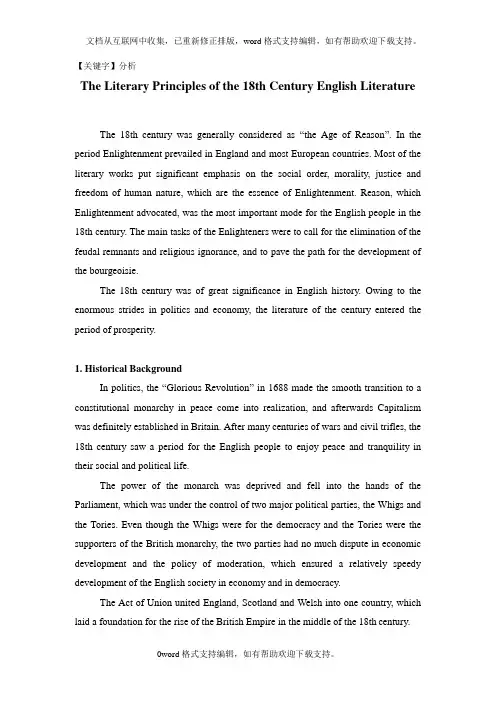
【关键字】分析The Literary Principles of the 18th Century English LiteratureThe 18th century was generally considered as “the Age of Reason”. In the period Enlightenment prevailed in England and most European countries. Most of the literary works put significant emphasis on the social order, morality, justice and freedom of human nature, which are the essence of Enlightenment. Reason, which Enlightenment advocated, was the most important mode for the English people in the 18th century. The main tasks of the Enlighteners were to call for the elimination of the feudal remnants and religious ignorance, and to pave the path for the development of the bourgeoisie.The 18th century was of great significance in English history. Owing to the enormous strides in politics and economy, the literature of the century entered the period of prosperity.1. Historical BackgroundIn politics, the “Glorious Revolution” in 1688 made the smooth transition to a constitutional monarchy in peace come into realization, and afterwards Capitalism was definitely established in Britain. After many centuries of wars and civil trifles, the 18th century saw a period for the English people to enjoy peace and tranquility in their social and political life.The power of the monarch was deprived and fell into the hands of the Parliament, which was under the control of two major political parties, the Whigs and the Tories. Even though the Whigs were for the democracy and the Tories were the supporters of the British monarchy, the two parties had no much dispute in economic development and the policy of moderation, which ensured a relatively speedy development of the English society in economy and in democracy.The Act of Union united England, Scotland and Welsh into one country, which laid a foundation for the rise of the British Empire in the middle of the 18th century.In economy, the international trading and the lucrative slave trade brought tremendous wealth. Although almost all the European countries had been on the process of industrialization, in England the development was accelerated with the help of the new inventions and a large-scale Enclosure Movement all over the country. The social status of the newly rising bourgeoisie was gradually set up by the boom of economy at home and abroad.However, the time the capitalists accumulated the enormous profits was the time thousands of peasants were expropriated off the land and the labor workers lost their jobs. The gap between the ruling class and the oppressed was aggravated. The social contradictions were accumulated and deteriorated.In social life, economic development also brought changes for the English people’s way of life. The people began to have more energy to participate in the social life. Such places for the social activities as the coffeehouse, the theaters and libraries gradually thrived. In the coffeehouse, information, opinions and even gossips on various issues were exchanged and the style of literature was formed and influenced in the public way.The economic prosperity and the rising of the bourgeois class produced a new requirement for a new social order and rules to meet the need of the social development in politics and morality, and the need of a way to clear away the feudal remnants. The literary men achieved the aim by means of the introduction of the reason, morality, and equality. The development of science and technology boosted the process. Isaac Newton exerted great influence upon Enlightenment with his law of gravitation, which smashed the medieval superstition to the natural forces.2. The Principles of LiteraryIt was impossible to make a clear distinction of the different literary genres with so many factors mixed together. Roughly, the literature in the 18th century was divided into three periods, from the late of the 17th century to the middle of the 18th century the popularity of the Neoclassicism, the early to the middle 18th century the rapid growth of the realistic novels of Defoe, and the outstanding novelists Fieldingand Smollett, and the last decades of the prevalence of Sentimentalism and the appearance of Romanticism.The literary trend of this century could be summarized as the development of poetry, the prosperity of prose, the rise of novel and the decline of drama.2.1 Enlightenment in LiteraryThe 18th century is known as “the Age of Enlightenment”, which is a progressive intellectual movement as a furtherance of the Renaissance of the 15th and 16th centuries. The Enlightenment left a lasting heritage for the 19th and 20th centuries.Enlightenment was not only a culture and thought movement, but has exerted huge influence on almost all of the aspects of the English people’s social life. The Enlighteners took the task to enlighten the people with the modern ideas in philosophy, politics and arts. The Enlighteners believed that the universe was rational and could be understood through Reason. Truth could be got through the empirical observation. And reason was the only yardstick to measure all human activities and relations. Only in this way can the primitive thoughts and feudal behaviors, such as superstition, injustice, oppression and religious persecution, be eliminated. The Enlighteners also fought against the social hierarchy system and called on the development of science and technology.Besides, they praised highly for the function of education. They held the belief that the universal education could bring about rationality, equality and truth. They believed that the human beings could be manipulated like the engine once they acquired these characteristics.In essence, the Enlightenment Movement was the struggle of the progressive bourgeoisie against Feudalism. For the bourgeois intellectuals, the Reason was the weapon to overthrow the domination of Feudalism. They sought the freedom of politics and academic thinking to pave the way for the establishment of the Capitalism.In brief, the Enlightenment movement was to enlighten or educate the peoplewith the modern philosophical and artistic ideas. Literature at the time showed the strong characteristics of didacticism and moralization. Among the famous Enlighteners in England, John Dryden and Alexander Pope were the most conspicuous.2.2 NeoclassicismThe influence of the Enlightenment Movement to the English literature of the 18th century was first reflected in the emergence and popularity of the Neoclassicism. Neoclassicism was a literature genre that came into being in the middle and late of the 17th century in England and France, and thrived in the beginning of the 18th century. John Dryden,though dead in 1700, was the first advocator and the most important performer.After the Renaissance, a reaction came against intricacy, boldness and extravagance. In the period, the literature brought about a revival of interest in the old Classical works. The writers got the ideas and art forms from the classical times. As John Dryden stated in his Essay of Dramatic Poesy, the Neoclassicists demanded that literature should learn from the Classical works of the ancient Greek and Roman writers and also their contemporary French writers, such as V oltaire and Diderot. The Neoclassicists advocated simplicity, restraint, regularity and good sense. They believed that accuracy and wits should be the most important elements in the art creation.The Neoclassicists formulated fixed rules and laws guided by Greek and Latin works for the genres of literature to follow. They believed that there was the proper language to choose and the right style and tone to use when they wrote different literature, which was the “correctness” that they pursued. Therefore, such standards of the Classics as drama, rhyme and good proportion were advocated. Under the guideline, poetry should be lyric, epic, didactic, or dramatic, and prose should be precise, direct, smooth and flexible.Meanwhile, the Neoclassicists argued that literature should be judged by the function of moralization and education. Therefore, most of the literature during thatperiod was didactic so as to form a new social order and morality to meet the needs of the new era.What’s more, another aim of the literature was to entertain the readers. With the boom of the publishing industry and the increase of the educated population, new ways to entertain the mass, especially the people of the middle class, were called on. The expectation of the people to participate in social activities and express their emotions grew stronger. Hence, the simple, elegant and restraint writing styles gained popularity.Furthermore, the writings of Neoclassicism shared a common feature—objectivity. As the neoclassicists emphasized Reason and thought that art should be logically organized, neoclassical art did not appreciate the emotion or imagination, but logic, good organization and proportion. However, literature under this guideline seemed a bit cold and inhumane. The absence of any elements of romantic and the over emphasis on Reason led to the rise of the opposite genr e—Romanticism in the period followed.However, literature at that period was not simply the imitation of the Classics but something new was injected into it. Dryden, the advocator of the Movement, laid emphasis not only on Neoclassicism, but also on the traditional English literature. He praised the works of Shakespeare’s and Chaucer’s, and encouraged the combination of the classics with the native elements of England to make the writing style new. Dryden’s theory was modern and flexible, so it was easy to be accepted and promoted by his followers in the 18th century, such as Alexander Pope and Swift. The idea promoted the popularity of the English literature, especially the first half of the 18th century.With the influence of Neoclassicism, the prose was developed dramatically. A lot of prose writers and novelists appeared, like Addison, Daniel Defoe, Henry Fielding and Samuel Richardson.Even though the Neoclassicism did not flourish very long in the history of English literature and was substituted by the Sentimentalism and Romanticism. The ideas of reason, wit, simplicity and regularity existed and influenced the Englishliterature even to the modern times.2.3 The Origin of the English NovelThe 18th century was the golden age of the novel. The origin of the novel can date back to Homer’s epic, the legend in the medieval times of Europe and the adventure stories in Europe. However, in English literature, the novel, the new genre, emerged and the realistic novels reached the peak in the 18th century. Many great novelists, such as Defoe, Swift, Richardson, Fielding and Smollett, were not only world famous, but has left a great cultural heritage.In the 18th century, the rapid growth of economy boomed the city life. The middle class had more leisure time to entertain themselves. They called for fresh ways of entertainment and expressions of their thoughts and emotions. In the new social system, the patronage, which used to be the main means for the writers to get subsidization, was substituted by the new system of publishing and copyright. The writers had more freedom to write what they wanted to and some of them wrote to cater to the popular taste. At the same time, a new and great need for the reading emerged. Libraries stepped into the people’s daily life, so that more and more prints were called for in the huge market. They were all the reasons to promote the originality and development of English novels, especially the rise and the prosperity of the realistic novels in the 1730s to 40s.2.3.1 The Realistic NovelIn the first half of the 18th century, “reality”became the most important conception of the creation of novels. Novels were not only the means for the writers to reflect their life and feelings but also the way for the common people to express their passion and emotions.In the process of elevating their social status and accumulating the wealth, the bourgeois fought with the old system and had endured the hardships. The whole meaning of their life was to work hard, to make wealth and to get a better life. What was realistic in the true life was represented faithfully in the realistic novels of thecentury.The feature was best found in Robinson Crusoe, Denial Defoe’s masterpiece. Denial Defoe was named the “father of English realistic novel” by some scholars not only because Robinson Crusoe was the first realistic novel in the 18th century and the first modern English novel, but also it was a good example of the “truth to life”.In the novel, the writer gave the reader a vivid description of the spirit of struggle and adventure at the beginning of the Capitalism, and successfully portrayed an image of an enterprising Englishman. The realistic presentation of the growth and struggle of Robinson showed the spirit of that time. Robinson, as a businessman who pursued wealth, was a typical representative of the English middle-class men with courage, energy, persistence and wisdom. His struggle against the hostile natural environment showed the strong confidence of the bourgeoisie to fight for the ambitions. Robinson grew from a naive youth full of dreams into a realistic and hardened man, tempered by numerous trials in his eventful life.Besides, Robinson was also the representative of the bourgeois colonizers who took control of the new land and his servant, Friday. Therefore, this novel was the product of the Industrial Revolution and a real presentation of life of the common people.Generally, the writers of the realistic novels would claim that what they had written was really based on the true events with the real place names and the exact date as the background. At the beginning of Robinson Crusoe, “he” said, “I was born in the Year 1632, in the City of York, of a good Family, though not of that country, my father being a foreigner of Bremen who settled first at Hull.” And later the description of his life in Brazil as a planter conformed to the historical facts at that time. In the novel, the colloquial, easy language and sometimes, short, plain sentences were used to leave the readers the impression that the hero was true to life and was telling his stories face to face. In the narrative, the writers put an emphasis on the detailed account of the process and the description of the mental activity. In Robinson Crusoe, the vivid description of the details made the story fascinating. However, this novel was criticized for the repetition and the loose structure.Besides, even though the themes of the realistic novels were different, they had the same core, which was the searching for the essence of life. Through the account of the living conditions and the way of living at that period, the writers sought the answers from the common people, and even the vulgar and the poor, which was contrary to the traditional romance of aristocrats or epics. Through Robinson, who lived alone in an isolated island, and Tom Jones, an outcast in Henry Fielding’s masterpiece The life and History of the Foundling Tom Jones, the writers, against the mode of the Neoclassicism, expounded that the courage, the wisdom, the persistence and the morality of the mass people were the primitive power for the social progress.To summarize, the realistic novels, for the first time turning their attention from the grand themes and the high classes to the common people and the reality, adding the modern element to the writing style of that period. That is why Robinson Crusoe was taken as the forerunner of the modern novel.Besides Daniel Defoe, Henry Fielding and Tobias Smollett made even higher achievement. Their works had impact on some of the great works of European writers, and paved the way for the great 19th century realistic writers like Jane Austen, Walter Scott, Charles Dickens and William M. Thackeray.2.3.2 The Epistolary NovelIn the 18th century, another style emerged and brought in a new way of narrative, which is the epistolary novel. Samuel Richardson flourished the style by three famous works Pamela, Clarissa and Grandson.The novel Pamela was written in the form of a series of letters from the heroine to her parents. In the letters she told them her life and experience at her master’s house. The epistolary novels not only enriched the narrative form of the novel, but also transformed the role of the writers from the narrator to the editor. By means of the pile of letters, the heroine herself told the story. In the epistolary novel, the characters would get closer to the reader. The mental activities and the change of their emotions could be more vivid. It was easy to get the readers to resonate deeply with the fate of the heroine. Pamela was among the first novels to give detailed descriptionof the character’s psychology. It described not only the common life of the characters, but through the letters their inner thoughts and feelings. Therefore, this novel was also considered as the first psycho-analytic novel in the history of English literature. The vivid description of the psychology of the females gave an impetus to the development of the modern novels. From this perspective, Richardson was thought of the real founder of English modern novels by some scholars.The subtitle of the novel was Virtue Rewarded, the function of moral instruction and education was clearly showed in the novel beside that of entertainment.2.3.3 The Gothic NovelIn the last decades of the 18th century, the English realistic novel gradually gave way to the Gothic novel or the Gothic romance.The Gothic novel refers to the strange, mysterious adventures happening in dark and lonely places such as graveyards and old castles built in the middle ages, such as the Gothic castle. The Gothic novel originated from Horace Walpole’s novel The Castle of Otranto in 1764. As a branch of the English literature, the Gothic novels played an important role in the development of the horror movies and left great influence upon the English romanticists.Generally speaking, the Gothic novels included such elements as horror, mystery, supernature, and death. Usually the story would be set in the classic castles with haunted ghosts. The typical story focused on the sufferings or mystery imposed on an innocent heroine. Frequent use was made of ghosts, mysterious disappearances, sensational and supernatural occurrences. The principal aim of such novels was to evoke chilling terror by exploiting mystery and a variety of horrors.2.4 The Satire StyleSatire,another typical feature of this period’s writing, prevailed in the first half of the 18th century. A common feature of satire was to use strong irony or sarcasm, usually in parody, exaggeration and comparison, to attack something they did not accept or approve of. Not only was satire an effective weapon for arguments of allkinds and attacks on the political views, the social system and social life, but also it answered well the purpose of the Enlightenment, aiming at universal education to perfect the mass in moral, social as well as cultural life.In the 18th century, satire prevailed at a certain historical background. Even though this was a relatively peaceful period in English history, various divergences of values and conflicts still existed. With the increase of the wealth, the bourgeoisie expected to have higher social status and more power to control the nation, which was to turn over the social hierarchy and social custom. The contradictions between the two parties increased the social unrest. Among them the contradictions between the ruling class and the laboring poor were gradually intensified. The industrial Revolution and foreign trade brought a large quantity of wealth to the country, but that did not spread to the mass of the poor people. Correspondingly, social problems and discontent were constantly emerging. The social reality was reflected in the literary works in a satirical style.Pope and Swift were the superb satirists during that period. Swift defined a good style as “proper words in proper places”. Their satires are well-known for witty remarks and adept techniques. So satire became the fashion and was performed almost in all forms of writing at the time.Jonathan Swift not only was one of the greatest representatives of the genre, but also was thought of the first writer to perform the modern satire. Even though he advocated Reason, he sometimes held certain skepticism to the “universal Reason”. He was well-known for his meaningful wording and the diversified writing techniques in his satiric novels.In A Modest Proposal, the writer suggested a seemingly logical proposal for the Irish slum, only to mock the heartlessness and selfishness of the high classes as well as their inhumane Irish policy in general. This essay has been regarded as the most ridiculous and savage ironical satire.In Gulliver’s Travels, the writer used fancy to make up an imaginary social condition, by using imaginary plots and exaggerated techniques to satirize and attack the social system and the politics. The book seemed to be an allegorical story forchildren, but in it the vanity and hypocrisy of the contemporary courts, statesmen and political parties were satirically attacked. In the first two parts of the novel, the writer mocked the conflicts between the parities, the Whigs and the Tories. In the part of the Flying Island, the writer described the strange and useless experiments that the scientists did, through which Swift satirized that the science was far away from the practical life.Henry Fielding’s works showed a grand panorama of life of the 18th century English society through the realistic description of the details. In his works, the characters were true-to-life, and full of optimism. Yet he also mildly criticized the weakness of the human nature and the vulgar social customs. His works Joseph Andrews was at first written to ridicule Richardson’s Pamela for its utilitarian morality, but made a big success unexpectedly. He claimed that this novel was “a comic epic poem in prose”in the preface of Joseph Andrews. However, different from the traditional epic, which is a genre generally used to praise heroes, nobles or kings, Fielding took advantage of the conception but portrayed the heroes of the middle or low classes so as to produce the ironic effect.Fielding’s Jonathan Wild the Great is a bitter satire on the exploiting and oppressing class. It is one of the best exposures of the corruption of the English bourgeois-aristocratic society. The “great”in the title referred not only to the hero “Jonathan Wild”, but also the minster “Robert Walpole” and other “great” men in the ruling class. From these men, Fielding summarized a common virtue “greatness” from their true nature of tyranny, corruption, oppression and exploitation to others.The Life and the History of Tom Jones, a Foundling, as Fielding’s masterpiece, was another good example. The story, through the growth of a foundling, Tom Jones, touched upon all kinds of people as well as the social problems. The novel was about a young man and a young woman who tried to unravel their birth myth, and their love story. In the process of their looking for their birth, Fielding gave the readers an extensive view of the social life in the city and the town. Through the comparison of different characters they met, the writer severely criticized the corruption, greed and hypocrisy of the nobles at that period. Fielding contributed a lot to the advance of theEnglish and European novels.2.5 SentimentalismSentimentalism was a trend of thought beginning in the 1740s and 50s. Its name was gained from Laurence Stern’s A Sentimental Journey through France and Italy (1768). By the middle of the 18th century, sentimentalism came into being due to the discontent with the social reality.In the middle of the century, the contradictions were intensified to the degree that the nation was faced with the threat of instability. The Enlighteners, such as, Fielding and Smollett, who at first had sufficient faith in the eventual triumph of virtue and the final achievement of social justice, began to be skeptical about the eternal “truth” and Reason, which were preached by the bourgeoisie.Even though the people began to doubt the power of the Reason to solve the social problems, they could not find out a more positive way to make the society better. The decline of the great Enlightenment brought about sentimentalism and pre-romanticism as the protest against the social reality of the day. Sentimentalism was an outlet for their dissatisfaction to the reality and for the escape from the far-from-perfect reality. Sentimentalism was the forerunner of the Romanticism later prevailing in the European literature.Form the angle of the ideology, sentimentalism was against the classicism and the rationalism. It was totally opposite to the perspective of the rationalism that the individuals should be under the control of the sovereignty. Sentimentalism stressed the expression of the emotions and feelings of the individual in the daily life. It concentrated on the distress of the poor and the virtuous people. It revealed grief, pains and tears. The emotions were mainly melancholy, sentimental and sensitive.Leslie Stephen once argued, “Sentimentalism could be defined to be indulgence in emotion for its own sake. The sentimentalist does not weep because painful thoughts are forced upon him but because he finds weeping pleasant in itself (p160).”In sentimental works, the first characteristics is that the characters’ mood and miserable life were portrayed to arouse readers’ sympathy to the ordinary people and discontent towards the social reality. The appeal to sentiment, not Reason, was themain characteristics. Sentimentalists thought that Reason was only a cold rule or law to tell the people the code of conduct. In their views, human beings were born good and were endowed with compassion, kindness and morality. Hence, the function of literature was to awaken and motivate the potential.The writers usually made use of death, loneliness and miserable experience to make the atmosphere desolate, dark and melancholy. In this way, the readers were easy to move and full of sympathy to the character. At the beginning of the century, almost all the works, as poetry, novels and essays were rational, ironic and instructive. Sentimentalism totally changed the direction of English literature. At the same time, the educational function was also fulfilled.Besides, the common people molded in the works made the readers feel real empathy for what the characters had been through. And the sympathy for the misery of others became a sign of good manners and social morality.What’s more, in the views of the sentimentalists, there was no distinction of the genres of literature, that is, elegance or vulgarity. Therefore, a lot of different literature styles, such as prose, lyric, letter, autobiography, became the common styles in sentimentalism.Sentimentalism, having obtained pleasure in nature and the mysterious, paved the way for Romanticism, which put high value on nature and spontaneous expression of emotion. In addition, romanticists’ praise for the virtue of the common people and the attack on the rich and the system owed a good deal to sentimentalism.The most outstanding figure of English sentimentalists are Laurence Sterne who wrote A Sentimental Journey through France and Italy in 1768 and Thomas Gray with his masterpiece, Elegy Written in a Country Churchyard, the model of sentimental poetry.Sentimentalism in poetry first found its full expression in the 40s and the 50s and was the bridge from Classicism to Romanticism. In Thomas Gray’s Elegy Written in a Country Churchyard, the poem reflected the poet’s melancholy on the death and the sorrowful life of human beings. The poet also pointed out that death was inevitable no matter who you were. This poem, with the well-balanced structure and。
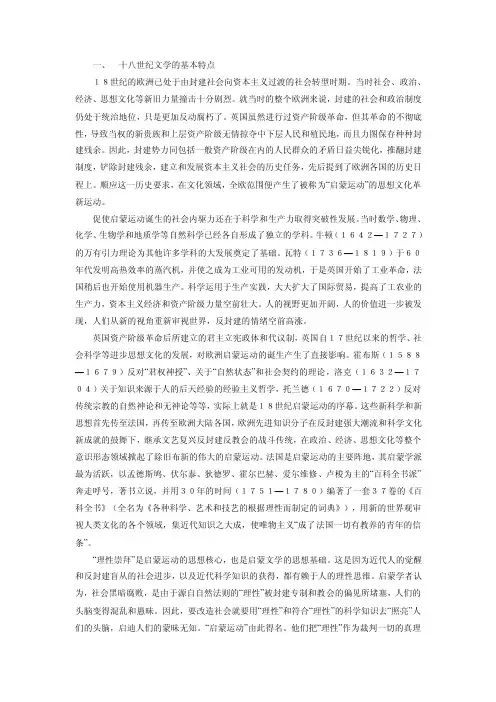
一、十八世纪文学的基本特点18世纪的欧洲已处于由封建社会向资本主义过渡的社会转型时期。
当时社会、政治、经济、思想文化等新旧力量撞击十分剧烈。
就当时的整个欧洲来说,封建的社会和政治制度仍处于统治地位,只是更加反动腐朽了。
英国虽然进行过资产阶级革命,但其革命的不彻底性,导致当权的新贵族和上层资产阶级无情掠夺中下层人民和殖民地,而且力图保存种种封建残余。
因此,封建势力同包括一般资产阶级在内的人民群众的矛盾日益尖锐化,推翻封建制度,铲除封建残余,建立和发展资本主义社会的历史任务,先后提到了欧洲各国的历史日程上。
顺应这一历史要求,在文化领域,全欧范围便产生了被称为“启蒙运动”的思想文化革新运动。
促使启蒙运动诞生的社会内驱力还在于科学和生产力取得突破性发展。
当时数学、物理、化学、生物学和地质学等自然科学已经各自形成了独立的学科。
牛顿(1642—1727)的万有引力理论为其他许多学科的大发展奠定了基础。
瓦特(1736—1819)于60年代发明高热效率的蒸汽机,并使之成为工业可用的发动机,于是英国开始了工业革命,法国稍后也开始使用机器生产。
科学运用于生产实践,大大扩大了国际贸易,提高了工农业的生产力,资本主义经济和资产阶级力量空前壮大。
人的视野更加开阔,人的价值进一步被发现,人们从新的视角重新审视世界,反封建的情绪空前高涨。
英国资产阶级革命后所建立的君主立宪政体和代议制,英国自17世纪以来的哲学、社会科学等进步思想文化的发展,对欧洲启蒙运动的诞生产生了直接影响。
霍布斯(1588—1679)反对“君权神授”、关于“自然状态”和社会契约的理论,洛克(1632—1704)关于知识来源于人的后天经验的经验主义哲学,托兰德(1670—1722)反对传统宗教的自然神论和无神论等等,实际上就是18世纪启蒙运动的序幕。
这些新科学和新思想首先传至法国,再传至欧洲大陆各国,欧洲先进知识分子在反封建强大潮流和科学文化新成就的鼓舞下,继承文艺复兴反封建反教会的战斗传统,在政治、经济、思想文化等整个意识形态领域掀起了除旧布新的伟大的启蒙运动。

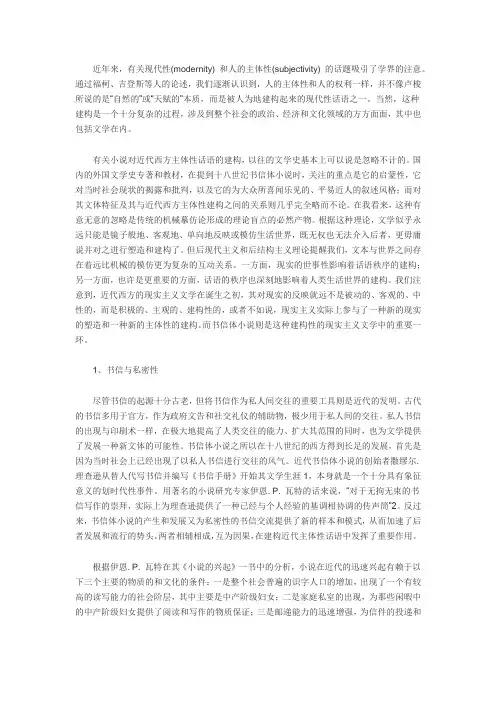
近年来,有关现代性(modernity) 和人的主体性(subjectivity) 的话题吸引了学界的注意。
通过福柯、吉登斯等人的论述,我们逐渐认识到,人的主体性和人的权利一样,并不像卢梭所说的是“自然的”或“天赋的”本质,而是被人为地建构起来的现代性话语之一。
当然,这种建构是一个十分复杂的过程,涉及到整个社会的政治、经济和文化领域的方方面面,其中也包括文学在内。
有关小说对近代西方主体性话语的建构,以往的文学史基本上可以说是忽略不计的。
国内的外国文学史专著和教材,在提到十八世纪书信体小说时,关注的重点是它的启蒙性,它对当时社会现状的揭露和批判,以及它的为大众所喜闻乐见的、平易近人的叙述风格;而对其文体特征及其与近代西方主体性建构之间的关系则几乎完全略而不论。
在我看来,这种有意无意的忽略是传统的机械摹仿论形成的理论盲点的必然产物。
根据这种理论,文学似乎永远只能是镜子般地、客观地、单向地反映或模仿生活世界,既无权也无法介入后者,更毋庸说并对之进行塑造和建构了。
但后现代主义和后结构主义理论提醒我们,文本与世界之间存在着远比机械的模仿更为复杂的互动关系。
一方面,现实的世事性影响着话语秩序的建构;另一方面,也许是更重要的方面,话语的秩序也深刻地影响着人类生活世界的建构。
我们注意到,近代西方的现实主义文学在诞生之初,其对现实的反映就远不是被动的、客观的、中性的,而是积极的、主观的、建构性的,或者不如说,现实主义实际上参与了一种新的现实的塑造和一种新的主体性的建构。
而书信体小说则是这种建构性的现实主义文学中的重要一环。
1、书信与私密性尽管书信的起源十分古老,但将书信作为私人间交往的重要工具则是近代的发明。
古代的书信多用于官方,作为政府文告和社交礼仪的辅助物,极少用于私人间的交往。
私人书信的出现与印刷术一样,在极大地提高了人类交往的能力、扩大其范围的同时,也为文学提供了发展一种新文体的可能性。
书信体小说之所以在十八世纪的西方得到长足的发展,首先是因为当时社会上已经出现了以私人书信进行交往的风气。
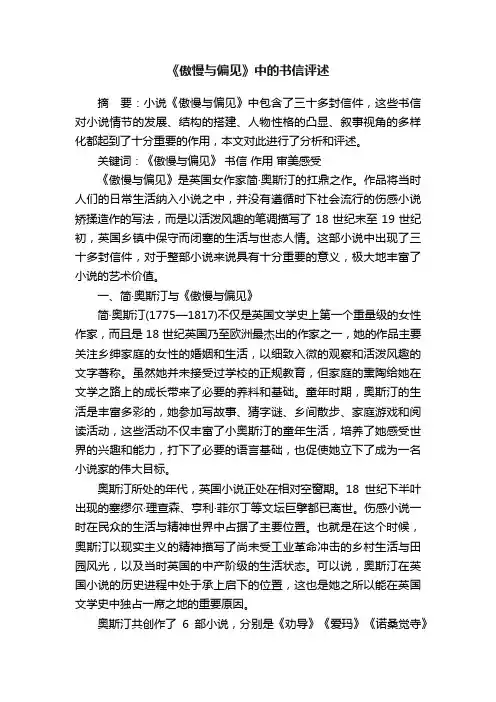
《傲慢与偏见》中的书信评述摘要:小说《傲慢与偏见》中包含了三十多封信件,这些书信对小说情节的发展、结构的搭建、人物性格的凸显、叙事视角的多样化都起到了十分重要的作用,本文对此进行了分析和评述。
关键词:《傲慢与偏见》书信作用审美感受《傲慢与偏见》是英国女作家简·奥斯汀的扛鼎之作。
作品将当时人们的日常生活纳入小说之中,并没有遵循时下社会流行的伤感小说矫揉造作的写法,而是以活泼风趣的笔调描写了18世纪末至19世纪初,英国乡镇中保守而闭塞的生活与世态人情。
这部小说中出现了三十多封信件,对于整部小说来说具有十分重要的意义,极大地丰富了小说的艺术价值。
一、简·奥斯汀与《傲慢与偏见》简·奥斯汀(1775—1817)不仅是英国文学史上第一个重量级的女性作家,而且是18世纪英国乃至欧洲最杰出的作家之一,她的作品主要关注乡绅家庭的女性的婚姻和生活,以细致入微的观察和活泼风趣的文字著称。
虽然她并未接受过学校的正规教育,但家庭的熏陶给她在文学之路上的成长带来了必要的养料和基础。
童年时期,奥斯汀的生活是丰富多彩的,她参加写故事、猜字谜、乡间散步、家庭游戏和阅读活动,这些活动不仅丰富了小奥斯汀的童年生活,培养了她感受世界的兴趣和能力,打下了必要的语言基础,也促使她立下了成为一名小说家的伟大目标。
奥斯汀所处的年代,英国小说正处在相对空窗期。
18世纪下半叶出现的塞缪尔·理查森、亨利·菲尔丁等文坛巨擘都已离世。
伤感小说一时在民众的生活与精神世界中占据了主要位置。
也就是在这个时候,奥斯汀以现实主义的精神描写了尚未受工业革命冲击的乡村生活与田园风光,以及当时英国的中产阶级的生活状态。
可以说,奥斯汀在英国小说的历史进程中处于承上启下的位置,这也是她之所以能在英国文学史中独占一席之地的重要原因。
奥斯汀共创作了6部小说,分别是《劝导》《爱玛》《诺桑觉寺》《傲慢与偏见》《理智与情感》《曼斯菲尔德庄园》。
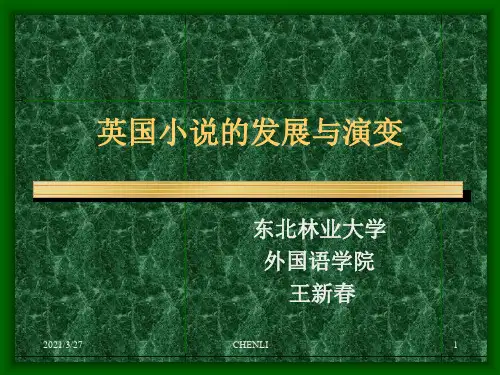
文学评论·外国文学论书信体小说的主要特征——以《长腿叔叔》为例黄亚文 辽宁师范大学摘 要:书信体小说的主要特点是小说的故事情节是由一封封书信组成,其独具特色的艺术形式影响了很多学者,具有特殊的艺术价值。
如今,随着电子网络的普及和信息时代的到来,虚拟空间的交流变得必不可少,为书信体小说注入了生机与活力。
本文主要从文体学的详细分析了书信体小说的主要特征及其在小说《长腿叔叔》中的应用体现。
关键词:书信体小说;文体特征;长腿叔叔;简•韦伯斯特[中图分类号]:I106 [文献标识码]:A[文章编号]:1002-2139(2019)-20-106-021、引言欧洲文学史上,书信文体可以追溯到古希腊时期,在18世纪得到了蓬勃发展。
在19世纪,由于叙事方式的限制,书信体小说开始衰落甚至灭绝。
在20世纪,书信为女性提供了一个直接表达自己的平台。
因此,书信体小说推向新的发展阶段,书信体小说再次吸引了学者和读者的注意。
《长腿叔叔》(Daddy-Long-Legs)是由美国作家让•韦伯斯特撰写的著名书信体小说,该小说自出版以来深受人们的欢迎。
因此,本文试图从文体角度研究书信体小说的主要特征,并分析了在小说《长腿叔叔》中的应用体现。
2、书信体小说的定义和主要特征写信是一种非常古老的写作形式,信件是人类漫长历史中的交流渠道之一(Rebecca Earle,1998)。
随着信件交流的发展,书信逐渐融入文学中,许多作家倾向于通过书信叙述小说。
但到目前为止,书信体小说还没有明确的定义。
但一些学者提出了自己的看法。
Jorn Norwich认为,书信体小说是指一种由一系列书信组成的小说。
McKee表示,书信体小说通常指的是由一个或多个书信书写的小说,它们代替作者引导整个小说的话语。
作者记录同一事件并通过书信表达了各种观点,但自身没有参与文本叙述(McKee,1985)。
作为一种特殊的文学形式,书信体小说在某种程度上成为了人物与读者之间内外的对话。
万方数据
万方数据
万方数据
书信体小说的独特叙事魅力
作者:刘明明, LIU Ming-ming
作者单位:安徽工业大学外国语学院,安徽马鞍山,243002
刊名:
安徽工业大学学报(社会科学版)
英文刊名:Journal of Anhui University of Technology(Social Sciences Edition)年,卷(期):2011,28(6)
参考文献(12条)
1.林骧华西方文学批评术语辞典@词条"书信体小说” 1989
2.Shaw Harry"Epistolary" from Dictionary of Literary Terms 1970
3.李维屏评理查逊的书信体小说艺术[期刊论文]-外国文学评论 2002(03)
4.Beebee Thomas O Epistolary Fiction in Europe 1500-1850 1999
5.马丁·华莱士;伍晓明当代叙事学 1991
6.韦勒克,雷;华伦,奥;刘象愚文学理论 1984
7.卢梭;让-雅克;李平沤;何三雅,泽新爱洛伊丝 1993
8.歌德;韩耀成少年维特的烦恼 2010
9.巴赫金;白春仁陀思妥耶夫斯基诗学问题 1988
10.黄梅推敲"自我”:小说在18世纪的英国 2003
11.瓦特;伊恩·P;高原小说的兴起 1992
12.陈平原中国小说叙事模式的转变 2003
本文链接:/Periodical_angydxxb-shkxb201106019.aspx。
学术界!(双月刊)总第126期,2007.5ACADEM I C S I N CH I NANo.5Sep.2007十八世纪英国小说的文化解读∀贺宁杉(南京审计学院 外语系,江苏 南京 211800)#摘 要∃小说是英国文艺复兴之后文学发展的新模式,它一反过去旧文学表现贵族生活的传统,主要描述普通人的生活方式,展示了他们的精神境界、价值观念、道德情操,表达了这一时期大众文化的审美理念,说明了这一时期的大众文化已成为社会的主流文化。
#关键词∃小说;普通民众;审美理念;大众文化文化是一定时期社会的政治、经济、宗教、伦理、法律、价值观念、生产力水平以及人们的生活习俗等方面的总和,它决定了特定时期社会文明的程度。
文学艺术作为社会的审美意识形态,在一定意义上是一种具有特殊文化属性的精神活动。
它所描述的生活场景,所塑造的人物形象,所表达的审美理念都反映出一定文化模式下的人们的生产方式、生存方式、情感体验以及对生命意义的探索。
因此,栩栩如生的人物形象,丰富生动的社会生活场景都突现出社会文化的丰富信息。
一小说是十八世纪英国文学的主要成就,也是英国文学在文艺复兴之后文学发展的新模式。
文艺复兴时期文学的主要成就是戏剧,那时人们坐在戏院中欣赏戏剧,了解社会,把握生活,提升境界,陶冶情操。
而到了十八世纪人们对文学的欣赏转变到了对叙事文学文本的阅读,人们在平实的语言中了解普通人的生活故事,体验他们在生活中的复杂情感。
这种文学模式的变化,反映了这一时期作者简介:贺宁杉(1972 ),南京审计学院外语系讲师,研究方向为英语语言文学。
学术界2007.5%学者专论社会发展的变化,正如约翰%理查得在他的十八世纪小说!中所说的&在英国我们称为小说的东西,是作为一种对深远文化和社会变化的文学的反映而出现的∋。
#1∃这种文学创作及欣赏的变化肯定与当时社会文化的发展变化有密切的联系,归纳起来至少有以下几方面的因素起到了决定性的作用:首先是社会读者阶层的不断扩大。
收稿日期:2005-12-29 修回日期:2006-06-08作者简介:赖骞宇(1964-),女,江西鄱阳人,副教授,博士,从事比较文学与世界文学研究;詹慧芳(1974-),女,江西南昌人,2004级硕士研究生。
试论18世纪英国小说文体的形成与社会文化的关系赖骞宇,詹慧芳,袁 演(南昌大学人文学院中文系,江西南昌 330047) 摘 要:18世纪英国小说是作为一种对深远的文化和社会变化的文学反映而出现的。
社会和文化的变化以文学的形式反映出来,小说成为了一种载体;反过来,因为小说对于这些变化的反映而进一步促进了这些变化的发生并且使某些观念得以牢固树立。
关键词:18世纪;英国;小说;文体;文化 中图分类号:I 10614 文献标识码:A 文章编号:1006-0448(2006)05-0088-06 西方文学中的小说,是18世纪后期才正式定名的文学形式,此前的准小说形式被称为“散文虚构故事”。
从文学发展史来看,18世纪以前的叙事作品或者采用诗歌体裁叙述故事(如骑士传奇),或者虽采用散文体叙述但其体裁和结构却像史书和编年史(如《圣经》);即使是17世纪后期出现的散文传奇在各方面已经很接近后来的小说,但它的虚幻性使其与真正意义上的小说仍有一定的距离。
小说文体直到18世纪才在英国形成并兴盛起来。
作为一种新的叙事文类,小说的诸多因素是在新的历史氛围里逐渐出现并最终成为一种文学传统的。
18世纪小说代表了其发展的前历史部分,它们构成了作为散文虚构文类的小说早期的形成阶段。
在这一阶段,文艺复兴以来的人文主义和宗教改革运动对西欧的社会文化产生了深远的影响,社会和文化正发生着巨大的变化,这些变化必然影响到文学艺术的创作。
公众对巨变中的现实生活怀有浓厚的兴趣,作家则以文字为工具,创造出一个完全真实的虚构世界。
当然这时的小说艺术性还很贫乏,写作者也基本上不是职业小说家,而且当时的小说家还经常把虚构故事当作事实或戏剧化的事实来表现,关于事实和虚构的区分在那时的叙事作品中是很难确定的。
3下 2017年 第9期(总第563期)【广角镜】 Wide-angle Lens18世纪,英国资产阶级开始兴起,文学领域也出现了新的文学形式小说。
资产阶级的兴起促进了个人经验叙述方式的兴起。
同时,个人经验开始取代集体传统的趋势越来越大,这种转变是“小说兴起的总体文化背景的重要组成部分”。
个人经验或自我经验成为了文学家们主要的关注点。
卢卡奇认为,小说是近代资本主义的产物,是“一个时代的具有代表性的艺术形式”。
因此,小说的兴起也代表资产阶级自我意识的兴起。
以丹尼尔·笛福、塞穆尔·理查逊以及亨利·菲尔丁等人为代表的18世纪的作家虽然不是职业“小说家”,但是他们的作品标志着英国小说的兴起,也体现了作为主要社会阶层的资产阶级自我意识形成的过程。
在《文艺复兴时代的自我塑造》中,格林布拉特指出“自我塑造”是现代个人建构自我身份的努力。
自我既存在于想象性的文艺创作中,同时也存在于现实生活中,二者之间没有泾渭分明的界限。
因此,不仅《克拉丽莎》中的人物反映了当时处于上升期的资产阶级自我塑造,作者理查逊本人的现实人生经历也再现了资产阶级发展过程中自我意识兴起的历程。
当时的资产阶级基本完成了资本的原始积累,已经获得了一定的发展。
虽然资产阶级进入了扩大生产的时期,但他们并没有完全脱离资本的原始积累过程。
最大限度的获取利润和财富是资产阶级最基本的特征,这其中最突出的代表是哈罗维家族不择手段地追名逐利。
与此同时,资产阶级开始从对外部世界的关注转移到了内心精神世界的发展。
资产阶级对个人自我以及情感的关注日益突出,甚至有走向极端的倾向。
物极必反,为了平衡个人主义与自我膨胀的极端发展,理查逊通过塑造克拉丽莎这一角色,试图通过理性和道德来平衡资产阶级对内外世界的关系,从而建立起理想的资产阶级自我形象。
一、异化的资产阶级自我在小说中,老詹姆斯以及小詹姆斯是哈罗维家族的核心成员,他们的价值观是金钱至上。
资产阶级最突出的特征是他们的一切目的都是为了财富的增值和衍生,他们的最终目的是追求利益,并且永久性地再生利益。
浅谈十八世纪英国书信体小说特征
摘要:英国作家塞缪尔·理查逊于十八世纪五十年代向英国文学领域推出了书信体小说,他的书信体小说对当时的英国产生了较深的影响。
书信体小说属于一种特殊的文学体裁,其本身具有特殊的文学特征,具有对话性、私密性以及即时性等鲜明的特征。
十八世纪是英国书信体小说的繁荣发展阶段,自此以后英国的书信体小说逐步走向沉寂,在现代社会书信体小说以某种崭新的形式发生了转化。
关键词:书信体小说;塞缪尔·理查逊;帕梅拉;私密性
一、引言
书信体小说最早起源于西班牙,时间是在十五世纪。
英国作家塞缪尔·理查逊于十八世纪五十年代向英国文学领域推出了书信体小说,他的书信体小说对当时的英国产生了较深的影响力,《帕梅拉》、《克拉丽莎》《格兰狄森》都是塞缪尔·理查逊的书信体小说代表作,对当时英国社会反响很大。
书信体小说属于一种特殊的文学体裁,其本身具有特殊的文学特征,具有对话性、私密性以及即时性等鲜明的特征。
十八世纪的英国书信体小说立足于当时英国社会的方方面面,涉及政治、经济、历史文化等各个领域,对促进十八世纪英国的社会发展产生了积极的影响。
十八世纪是英国书信体小说的繁荣发展阶段,自此以后英国的书信体小说逐步走向沉寂,但是在现代社会我们仍然可以继续找寻到书信体小说的影子。
二、十八世纪英国书信体小说繁荣发展的历史背景
英国小说的发展与成熟是一个循序渐进的过程,英国小说的繁荣发展与社会方方面面的发展息息相关,对这一点伊恩·P·瓦特在他的著作《小说的兴起》中表示了肯定。
社会经济的发展,人们的受教育水平逐渐提高以及家庭私窒的产生都成为推动小说获得繁荣发展的影响因素。
英国小说在不同阶段的发展都紧密地与英国社会的经济文化、政治历史等众多方面相连。
英国小说在十八世纪出现了跨越式的发展,英国小说在这一时期进入全面崛起阶段。
十八世纪的英国社会在休闲娱乐、消遣方式方面十分贫乏,人们之间的通讯方式也十分落伍,这种现状促进了民间书信往来的繁荣,这些都成为推动英国书信体小说繁荣发展的有利要素。
在这样的形势下英国的书信体小说终于作为一种正式的文学体裁在英国社会广泛发展起来。
三、十八世纪英国书信体小说的特征
(一)十八世纪英国书信体小说的具有鲜明的文学性特征
顾名思义,书信体小说就是采用书信的形式编写小说。
整个小说都采用书信体来进行表达,有关小说的格式、结构、情节设计与展开、小说的人物形象塑造、环境描写、心理描写等全部都是采用书信的形式来完成的。
书信体小说拉近了读者与故事的距离,具有很强的真实感与亲切感,因为整个故事内容、包括情节、人物形象刻画等都是以主人公游解的形式实现的,整个小说都是主人公亲力亲为,亲身见闻的前提下铺展开来的,极富真情实感,具有很强的感染性。
书信体小说的产生拓宽了小说作为文学体裁的表达形式,书信体小说与生俱来就有一种亲和力。
书信体小说更容易打开读者的心灵,拉近读者与作品中人物的距离,使读者更容易把握小说中人物的情感特征、内心活动以及小说的主题思想。
有英国的文学评论家对书信体小说发表了评论,“书信体小说有两方面突出的作用,一方面由于书信体小说具有很强的即时性的特征,因此可以对读者产生深刻的印象;另一方面书信体小说具有鲜明的对话性与私密性的特征,可以更加客观地对人物的心理活动变化进行刻画,涉及到对人物意识流方面的研究与探索。
”《帕梅拉》、《克拉丽莎》、《格兰狄森》都是塞缪尔·理查逊的书信体小说代表作,对当时英国社会反响很大,有力地推动了书信体小说在英国社会的普及与推广。
《帕梅拉》是塞缪尔·理查逊最早的书信体小说代表作。
《帕梅拉》整部小说的情节是以女主人公帕梅拉·安德鲁斯采用第一人称与父母通信的形式自然展开的,一系列的书信围绕主人公的情感历程变化以及曲折的命运为中心展开,行文跌宕起伏,引人入胜。
帕梅拉》从结构上来看一共由六十九封书信构成。
整部小说一共有六位写信人。
但是大多数的书信都是由第一主人公帕梅拉写的。
《帕梅拉》在开篇是以悲剧的形式导入的,情节设置矛盾突出,波澜起伏,引人入胜,悲剧味道浓郁。
当矛盾激化到高峰时,作者又忽然笔锋陡转,开拓出“山重水覆疑无路,柳暗花明又一村”的境界,可见作者文字驾驭的技术是何等高超。
(二)十八世纪英国书信体小说具有私密性特征
私密性是书信体小说与生俱来的一种天然特征,这种私密性一直与书信体小说的发展紧密相连。
书信体小说可以对作品中人物的私密性内心活动及情感进行显现,同时这种文体的创作及阅读都具有一定的私密性,一般来说都是在比较私人化的个人空间内展开的。
从某种角度来说书信体小说是对回忆体小说的一种继承与发展,回忆体小说
一般采用第一人称“我”的形式展开叙述,书信体小说则以第二人“你”或“你们”为创作对象展开创作。
以《帕梅拉》为例,这部作品是通过帕梅拉给她的双亲写的第一封信开篇的,这样的形式就使得作品中主人公的注意力集中在她的双亲身上,而并非集中在通常意义上的读者身上。
帕梅拉通过书信的形式向她的父母进行真情告白,情真意切极富有感染力,这种叙述方式拉近了作品主人公与读者之间的心灵距离,并且书信本身所特有的私密性特征恰巧迎合了当时英国社会中产阶级的消遣趣味。
在当时英国社会中产阶级开始兴起,一般的中产阶级家庭都拥有私人化的单独房间。
纵观《帕梅拉》以及其他书信体小说,可以发现许多作品中的主人公都是在比较私人化的房间内展开写信或是看信的活动的。
书信体小说的私密性特征直接体现了当时英国社会中产阶级生活方式方面的一些特征。
(三)十八世纪英国书信体小说具有即时性特征
即时性是书信体小说的又一大鲜明特征。
书信体小说所展现的主人公的各种情感体验都立足于主人公的当下生活,这一点与回忆体小说有着鲜明的区别,回忆体小说从时间上来看主要面向过去。
从作品《帕美拉》里面,读者会持续不断地看到一些表明时间的语句,例如“将近下午一点钟”、“早上六点钟”、“我必须在这里中断,因为有人来了”等等,这种叙述方式都体现了小说发生的即时性,即强调的是作品主人公当下的生活,这样就会增加读者的现场感,拉近了读者与作品主人公之间的距离,具有较强的吸引力,仿佛读者也置身于作品主人公所处的当下,与作品主人公在情感上实现了共振,甚至达到一种忘我的境界。
(四)十八世纪英国书信体小说具有对话性特征
对话性是书信体小说的另一个鲜明特征。
从书信体小说的发展来看,其作品一般都会涉及两个或者两个以上的主人公,正是主人公之间的书信对话才推动了作品情节的展开发展。
写信的人往往都会确定一个固定的倾诉对象,也就是将来读信的人。
读信的人也会结合书信的内容有针对性地对写信人进行回信,回信的内容有时会涉及为写信的人答疑解惑,情感劝说等,一来一往就展开了书信式的对话。
作品是以书信往来的形式展开的,这种对话性展现了人与人之间的一种沟通。
交流的内容涉及范围广泛,可以是生活方面也可以是情感方面的,在这种自然的交流过程中体现出一种亲切感,也会增强作者的体验感,使读者仿佛置身于其中。
这种特征同近代社会的发展趋势具有一致性,展现了集体向社会发展的进程。
四、英国书信体小说的衰落以及在现代社会的形式转化
十八世纪是英国书信体小说最为辉煌繁盛的阶段,在此之后书信体小说逐步走向沉寂。
十八世纪的理查逊推动了书信体小说的广泛发展,并且书信体小说在理查逊那里获得了非凡的成就,在社会上掀起了巨大的反响,十八世纪中叶以后书信体小说在数量上迅猛增多。
但是书信体小说的衰落是一个必然的结局,因为随着社会的不断向前发展,与书信体小说发展相适应的环境发生了改变,社会政治经济、历史文化方方面面的变化终将使书信体小说成为一个过去式。
发展至十九世纪,书信体小说在欧洲文学史上几乎已经完全没有了踪影。
书信体小说的鼎盛发展阶段已经成为历史回忆,但是随着现代社会的不断向前发展,社会通讯越来越先进发达,书信体小说以某种崭新的形式浮出历史水面。
随着现代网络的发展,出现了网络个人空间、Blog以及Faeebook等,这些与书信体小说有很多相似之处,从本质来说都是把比较个人化的带有私密性质的心情、生活或情感等,以书信或者日志的形式对某些特定人群进行公开。
特定的人群往往都是与写作主体密切相关的家人、朋友或者爱人等。
尽管现代的个人空间、Blog 以及Faeebook等较之于十八世纪的书信体小说有一定的差异,但是它们之间的相似性也是不容否认的,这些相似性必将会以某种形式对现代文学的发展继续产生影响。
参考文献:
[l]George WaLson.The Story of the Nove[M].London:Macmillan'1979.
[2]Ian Watt.The Rise of the Novel[M].London:Chatto & Windus,1967.
[3]曹卫东.交往理性与诗性话语[M].天津:天津社会科学出版社,2001.
[4]申丹,韩加明,王丽亚.英美小说叙事理论研究[MI.北京:北京大学出版社,2005.。